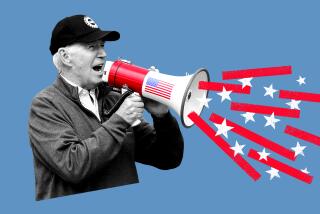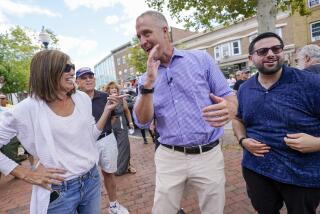Clinton Plans a Double-Barreled Attack : N.Y. primary: Arkansas governor seeks to keep Brown at bay by assailing flat-tax plan, sparring in debates. He also aims to deflect character issue.
- Share via
NEW YORK — Forced to confront an unexpectedly stiff challenge from former California Gov. Edmund G. (Jerry) Brown Jr., Arkansas Gov. Bill Clinton is trying to keep his foe at bay in the New York primary campaign by slamming his flat-tax proposal and sparring with him in a series of debates.
The two-pronged effort is partially aimed at diverting attention from Clinton’s own Achilles heel in the battle for the Democratic presidential nomination--the character issue.
A statewide poll released Wednesday suggests that the strategy is paying off. The survey, conducted Sunday and Monday by the Marist College Institute of Public Opinion, put Clinton ahead of Brown, 36.7% to 26%, among likely voters in the Democratic primary. The poll’s margin of error is plus-or-minus five percentage points.
Although the results were good news for the beleaguered Clinton campaign, the lead represents a slip of about six percentage points from his advantage over Brown in a poll taken March 24.
And most political analysts agree that the outcome of Tuesday’s New York vote remains in doubt as Brown presses his anti-Establishment appeal to discontented voters. The new poll showed 25.5% of the likely Democratic voters are undecided, giving Brown a large audience that might be receptive to his message.
So far the Clinton campaign appears to be demonstrating the same flexibility and resiliency that saved his candidacy from extinction in the Feb. 18 New Hampshire primary after he faced unsubstantiated allegations of adultery and questions about his draft status during the Vietnam War.
Clinton’s more recent political troubles were sparked by Brown’s upset victory in last week’s Connecticut primary. Brown came roaring into New York on a wave of momentum. And Clinton found himself initially on the defensive, forced to repeatedly apologize for having played golf two weeks ago at a segregated country club.
Undeterred, Clinton and his aides quickly put into operation their double-barreled battle plan.
Referring to the centerpiece of Brown’s domestic program--his call for a flat 13% income tax rate and a 13% value-added tax, Clinton New York campaign manager Harold Ickes said: “We have to go after Brown on his flat-tax idea.”
Clinton’s second imperative, Ickes said, was to keep attention on issues rather than character questions. “Bill Clinton has to lay out his program for running the country as President,” Ickes said.
The new Marist Institute poll indicates that the focus on Brown has had an effect. The survey found that the percentage of likely Democratic voters with an unfavorable impression of Brown increased 10 percentage points--to 32.3%--from the March 24 survey. Brown’s favorable ratings dropped 10 percentage points to 49.8%.
Lee Miringoff, the institute’s director, attributed the shift to the flat-tax issue. “That has been the focus of Clinton’s critique of Brown and, to the extent that it has been heard, it has hurt,” he said.
The new poll also found that Clinton’s unfavorable rating had remained about 31%, despite his revelation Sunday--the first day of the two-day polling--that he had tried marijuana while attending college in England. His favorable rating dipped in the new poll to 52.9% from the 56.9% seen in the March 24 survey.
Clinton’s indictment of Brown’s flat-tax proposal--that it benefits the affluent at the expense of those less well off--is particularly potent because it strikes at one of the mainstays of Brown’s candidacy, his self-designated role as champion of the underprivileged.
Interviews with voters attending a Brown rally at Union Square in Lower Manhattan on Wednesday tended to bear out Miringoff’s judgment on the impact of the flat-tax issue.
“It’s hard to get details of how that thing works,” said Joey Davis, a computer programmer who said he might support Brown but was troubled about the implications of the flat-tax proposal.
Even as they put the spotlight on the flat-tax plan, Clinton’s advisers became alarmed by the stream of nasty headlines in New York City tabloids, especially following his belated admission that he had smoked marijuana. So they decided to modify the second part of their strategy. Not only would Clinton stress his ideas for running the country, but he would do so in a series of debates with Brown leading up to Tuesday’s vote.
Judging from the response to the first debates, which began Tuesday, these sessions seem likely to dominate press attention. Thus, they could drive the issue of Clinton’s character into the background, barring some new disclosure.
Not surprisingly, Clinton used the first debates to continue to strike out at the flat-tax proposal. “I agree with the New York Daily News columnist who said it was the biggest rip-off of working people in the history of American politics,” he said during a Tuesday night forum in the Bronx.
A key Brown adviser on Wednesday discounted the impact of Clinton’s rhetoric on the flat-tax issue. “I don’t think that the flat tax is the issue,” said Patrick Caddell, arguing that it was possible for a voter to have doubts about the proposal and still support Brown for other reasons.
“I think this campaign is about what Brown said it’s about,” Caddell said. “It’s for the heart and soul of the Democratic Party.”
The new poll was not without encouraging news for Brown. The survey found that voters see him, more than Clinton, as caring about people like themselves, caring for the poor and the elderly and--perhaps most importantly in this year of discontent--standing for change.
Brown did relatively well among middle-class voters--those earning from $25,000 to $60,000 a year--while Clinton was strongest among the poor and the affluent.
Clinton had a big advantage when voters were asked about which candidate had the ability to handle the nation’s economic problems and to get things done. And by a margin of more than 3 to 1, those interviewed thought he had a better chance than Brown of beating President Bush in November.
In the survey, Clinton led Brown in New York City and among Upstate voters and ran close to even with him in the suburbs. Clinton also enjoyed a more than 2-1 advantage over Brown among two of New York’s key voting groups--blacks and Jews.
More to Read
Get the L.A. Times Politics newsletter
Deeply reported insights into legislation, politics and policy from Sacramento, Washington and beyond. In your inbox twice per week.
You may occasionally receive promotional content from the Los Angeles Times.










